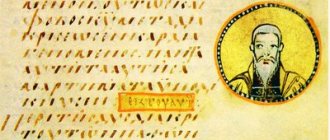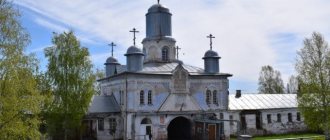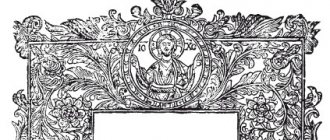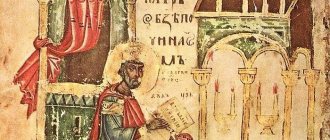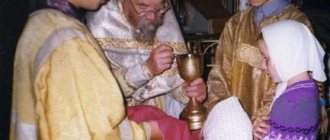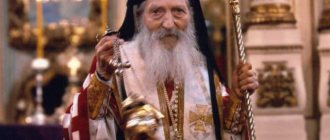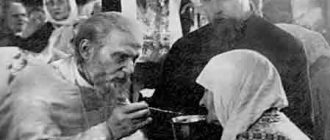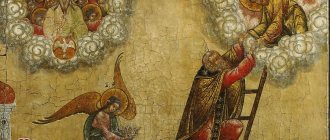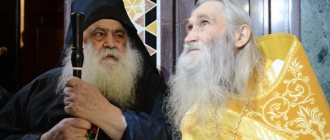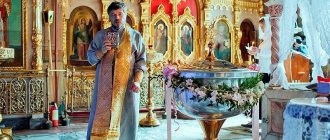Since ancient times, Abba in the Christian East has been called a spiritual mentor. Believers know St. Dorotheos in this capacity. His works are read and re-read. Wise thoughts that so accurately reflect the ailments of the soul are quoted. And practically nothing is known about him himself.
St. Dorotheus of Palestine
Life: what do we know from the biography of Saint Dorotheus of Palestine
Even the lifetime of the mentor of many Christians from ancient times to this day is determined approximately. Most theologians think it is the 6th century. Some call his hometown Ascalon.
Useful materials
The Road to Holiness
Apparently, Dorotheus came from a wealthy family, for from his youth, in his own words, education and books were available to him. And later, when Dorotheus became a monk, his brother allocated considerable funds to build a hospital for monastics in the monastery.
How, why the young man decided to go into the desert, he never expanded. But in the monastery it was not customary to ask. It is only known that the famous monastery of another Abba, Serid, became the site of the exploits of the newborn Dorotheus. The name of the elder to whom the monk devoted himself to obedience has also been preserved - John, also called the Prophet for his gifts of clairvoyance. Dorofey spent more than 10 years under the guidance of this mentor.
School of Humility
All this time he studied monasticism. This means that he not only revealed his thoughts to his spiritual father, he read the Scriptures. The monk went through the school of humility. He, as a novice, was assigned to serve the visiting wanderers, pilgrims, and sick brethren. This turned out to be the best, although painful for pride, school of humility. Irritation of the brethren, despondent in illness, embarrassed by pain, fear.
Laymen, often, contrary to the well-known saying, come to the monastery “with their own rules,” that is, habits, concepts that the monks left long ago. Dorotheos experienced all this, and then, already a famous teacher of piety, he often passed it on to his spiritual children. Here is a brother, irritated by something, taking his anger out on Dorofey:
“I remember very well how one brother, following me from the hospital to the church itself, reviled me, and I walked ahead of him without saying a word. When Abba found out about this - I don’t know who told him about this - and wanted to punish my brother, I went and fell at his feet, saying: “For the sake of the Lord, don’t punish him, I sinned, my brother is not at all to blame.”
And it happened even worse:
“Another one, either out of temptation or out of simplicity, God knows why, for a considerable time every night let his water flow over my head, so that my very bed was wet with it. Also, some of the other brothers came every day and shook out their bedding in front of my cell, and I saw that many bedbugs were gathering in my cell, so that I was not able to kill them, for they were countless from the heat. Then, when I went to bed, they all gathered on me, and I fell asleep only from extreme fatigue; when I got up from sleep, I found that my whole body was eaten away, but I never said to any of them: don’t do this, or why are you doing this? And I don’t remember that I ever uttered a word that could embarrass or offend my brother.”
The saint worked in the hospital for many years. I was so tired that I could barely stand for service, but I stood anyway. He asked the brothers to wake him up so as not to fall asleep, in his opinion, “too much.” There was no jealousy here beyond reason; it is simply impossible to endure the school of humility without God’s help, and where else to get it if not in church, in prayer?
“Everyone who prays to God: “Lord, give me humility,” should know that he is asking God to send him someone to insult him,” Dorotheos wrote about this time of his life, when he was already an abba, a famous elder.
By this time, his spiritual father had died, and the other brothers with whom he studied had also died. Then Dorotheos left the place of his tonsure, going to another monastery, perhaps not wanting to be elected abbot, as the brethren wanted. Sources testify that in the desert a new monastery arose from the disciples of Dorotheus, where the saint nevertheless had to preside. It was here, at the end of the 6th century, that he apparently departed into Eternity, leaving behind many disciples.
Disciple Dositheus
Among them is an amazing, simple monk named Dosifei. He came to the monastery from the world, knowing almost nothing about monasticism. Under the leadership of Rev. Dorotheus, in a short time, he achieved great humility, meekness, and finally became worthy of holiness. Even Dosifei, who had been seriously ill for many months, died out of obedience, asking permission to leave the world from the abbot.
This was the great teacher of humility, and this is how he remains now, talking with Christians in his works.
In his early years, Dorofey moved to Gaza, a border city where philosophy and art flourished
Although the Monk Dorotheos was nicknamed Gaza, he was born in another city - Ascalon. And today there is Ashkelon on the Mediterranean coast, although it is also not the same as it was originally. In 1270, the city was destroyed by the Turkish Sultan Bibars, and the harbor was filled with stones. Only the walls remain. For seven centuries Ascalon stood in silence.
(Zeph. 2:4)
"Ascalon will be empty"
By the time of the birth of the Monk Dorotheus, Ascalon had already experienced its dawn, destruction by Nebuchadnezzar II, and the Hellenistic period. The future saint was born in a great but fading city, which was a Byzantine autonomy.
Of course, Christianity had already spread to these lands, although it was not the only religion: Ascalon has always been inhabited by people of different nationalities and religions.
Abba Dorotheos was born in the city of Askalon
However, Dorotheus did not live long in Askalon and already in his early youth settled in Gaza. Christianity established itself in these lands, although this did not happen quickly or peacefully.
Gaza is not the last place in the ancient world: it was famous for philosophers, poets, rhetoricians, and many arts. A variety of cultures came into contact in it, and many of St. Dorotheos’ contemporaries sought a symbiosis of Christianity and ancient tradition.
But times were not calm. The border position of Gaza led to constant military clashes. The Persian Shahinshah Khosrow II Parviz repeatedly tried to conquer the city and even succeeded for a short time, and the Arabs did the same. By the way, in 634 they achieved their goal, but the Monk Dorotheos did not live to see it.
Books: what is included in the collection “Soulful Teachings”
Not many works remained from the ascetic. However, some of them simply have not reached our time. Among the texts now known to Christians:
- 10 messages;
- 21 lessons;
- recorded answers to the questions of the monk from his spiritual mentors - John the Prophet and Barsanuphius the Great: only 87 of them have survived.
Interesting fact
The first translations of the saint's works into the Slavic language appeared almost in the first years after the Baptism of Rus'. It is known that they constantly corresponded at the monasteries. For example, Kirill, the famous abbot of the Belozersk monastery (XV century), copied Dorotheus himself, and really loved this activity.
With the advent of printing, the saint’s works went through dozens of editions in Russia, also often with the participation of monasteries. Thus, in 1895, Optina Pustyn prepared a book that united most of the holy father’s works under the title “Soulful Teachings.” It is under this title that the collections of Abba Dorotheus are usually published in subsequent years.
21 lessons
Includes brief words that cover:
- rejection of the world;
- cutting off one's will;
- non-judgment of one's neighbor;
- struggle with passions;
- patience with temptations;
- sayings for different occasions.
Links
Wikiquote has a page on the topic of Avva Dorotheos
- Dorotheus, Holy Abba // Encyclopedic Dictionary of Brockhaus and Efron: in 86 volumes (82 volumes and 4 additional). - St. Petersburg, 1890-1907.
- Bernatsky M. M., Dionysius (Shlenov)
[www.pravenc.ru/text/180299.html Dorofey of Gaza] // Orthodox Encyclopedia. Volume XVI. - M.: Church-scientific, 2007. - P. 32-43. — 752 p. — 39,000 copies. — ISBN 978-5-89572-028-8 - [www.wco.ru/biblio/books/dorofey1/Main.htm Soulful teachings of Abba Dorotheus]
- [days.pravoslavie.ru/Life/life1240.htm Life] on the website Pravoslavie.Ru
- [books.google.pl/books?id=CXWohLgoPacC&pg=RA1-PA120&lpg#v=onepage&q&f=false Dorothei episcopi Tyri qui sub Constantino magno vixit, De vita ac morte Prophetarum et Apostolorum, Synopsis] Parisiis 1560
Images on icons
St. Dorotheus of Palestine
The saint is depicted in traditional monastic clothing. The icons convey to us his lifetime appearance as a gray-haired old man with a thick beard, and, of course, amazing kindness in his eyes.
The invariable accessory of icons is a scroll in the hands. After all, spiritual instructions are the memory that the monk left about himself. Sometimes the scroll is written unfolded, in which case the words of the monk are inscribed on it. There is also a variant of the icon, when a closed Gospel is written in the hands of the saint. The reverend's hand is raised in a characteristic oratorical gesture, meaning "I speak."
Instructions for every day of the week
Some excerpts from the teachings are contained in the often reprinted book of St. Dorotheus, “How to Grow Spiritually,” containing 7 instructions, one for each day of the week.
Each short conversation consists of small sayings. The saint’s words are dedicated to the fight against passions, with special attention paid to those from which many other sins arise. This:
- anger;
- condemnation;
- love of money.
These passions are destructive, but the saint’s advice breathes meekness, participation, and the kindness and sympathy for people sick with sin that were so characteristic of him during earthly life.
The monk's opinion on spiritual life
Abba Dorotheos believed that the main thing in spiritual feat is cutting off one’s own desires, that is, submission to the chosen spiritual father and humility - this is how the path to good begins. This is also the possibility of dispassion, since the reason to worry about one’s unfulfilled desires disappears, and attention is directed to spiritual work. But you need to obey only the elders, who are essentially charismatic, similar to the first man Adam, who, while in paradise, constantly glorified God with prayer and was in a state of contemplation - sin violated his pristine state.
The book “Teachings of Abba Dorotheus” contains only twenty-one teachings, each of which is devoted to some aspect of monastic life. Basically, the monk talks about sins that should be gotten rid of: lies, rancor, and condemnation of one’s neighbor. Abba Dorotheos reminds that in no case should you rely on your own reason - this means that the need for spiritual leaders arises, you need to live in constant fear of God. He talks about how to endure temptations and doubts, how to create a home for virtues in the soul.
In addition to purely practical instructions, the book also contains a chapter with short and succinct sayings by Abba Dorotheus, as well as appeals to specific individuals in the monastery, for example, cellarers. At the end of each of the teachings, Abba not only reveals the essence of the subject to which the chapter is devoted: he calls on readers to fight this or that sin, to strengthen a certain virtue.
Quotes
Here are just some of the sayings of the great Abba.
About the post
“We must not only observe moderation in food, but also refrain from every other sin, so that, just as we fast with the belly, we also fast with the tongue, refraining from slander, from lying, from idle talk, from humiliation, from anger and, in a word, from every sin committed by the tongue. One should also fast with the eyes, that is, not look at vain things, not give freedom to the eyes, not look at anyone shamelessly and without fear. Likewise, both hands and feet must be kept from every evil deed.”
About pride
“God does not so much leave the one who leads a vicious life when he lives disorderly or insolently, if he is not proud, as he leaves the reverent one when he is proud.”
About the fear of God
“...There are two fears: one initial, and the other perfect... one is characteristic, so to speak, of those beginning to be pious, the other is the “fear” of perfect saints who have achieved the measure of perfect love. For example, whoever does the will of God out of fear of torment is... still a beginner, for he does not do good for the sake of good itself, but out of fear of punishment. Another fulfills the will of God out of love for God, loving Him, in fact, in order to please Him. This one knows what essential good consists of; he knew what it meant to be with God. This one has true love, which the saint calls perfect. And this love brings him into complete fear, for such a one fears God and fulfills the will of God no longer out of “fear” of punishment, no longer of the day in order to avoid torment, but because he... having tasted the very sweetness of being with God, is afraid of falling away , afraid of losing her. And this perfect fear, born from this love, casts out the original fear; That’s why the Apostle says: perfect love casts out fear (1 John 4:18).”
About conscience
“A person should not do anything that he knows that he is doing it with the intention of offending his neighbor: by this his conscience is defiled, realizing that this was done in order to harm his brother or sadden him - and this means keeping his conscience in attitude towards one's neighbor."
Abba Dorotheos's prayer against anger
Merciful and humane God! By Your ineffable goodness, You created us from nothing, to enjoy Your blessings, and through the blood of Your Only Begotten Son, our Savior, Who called us, who had departed from Your commandments! Come now, help our weakness, and as You once rebuked the troubled sea, so now rebuke the disturbance of our hearts, so that You do not lose both of us, Your children, killed by sin, in one hour, and so that You do not say to us: “What good is it?” My blood, ever descend into decay,” and: “Amen I say to you, we do not know you,” because our lamps went out from the lack of oil. Amen.
Among the holy fathers, it is Dorotheus who is unique in his kindness, which shines even through the centuries in the words of his teachings and instructions. Therefore, the reader wants not only to revere this person, but also to be like him. We usually do poorly. But we are trying.
Natalya Sazonova.
